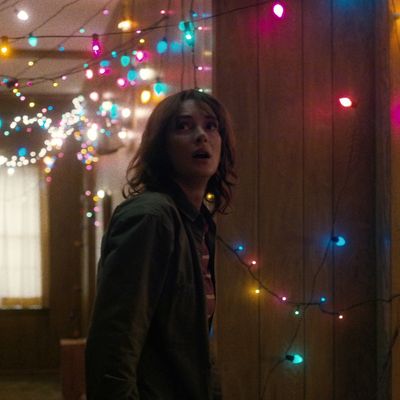
With “Holly, Jolly,” Stranger Things adds another period-appropriate sci-fi movie to its growing list of influences: Joyce’s attempts to communicate with her missing son mirror the intense obsession of Roy Neary in Close Encounters of the Third Kind. In both cases, there’s an evident madness to the behavior that alienates even those closest to Joyce and Ray, and, in both cases, they’re working toward a crude system for interacting with supernatural beings. Watching Close Encounters again recently, I was struck by the degree to which Roy’s singular obsession spilled into domestic turmoil. He wasn’t just idly slathering together Devil’s Tower out of mashed potatoes; he was operating without respect to anyone around him. When he finally starts shoveling dirt and tossing garden fences through the window of his house, his wife and kids cannot flee fast enough.
The difference with Stranger Things, of course, is that Joyce’s love for her family motivates her search for Will, rather than some mysterious, possessive outside force. Yet there’s a feeling from everyone — her boss at the pharmacy, who sells her stacks of Christmas lights; Mike and Nancy’s mother, Karen, who brings her a casserole; and even her own son, Jonathan, who’s following his own strange impulses — that Joyce has lost her mind. And who could blame her? Her son is missing. She hasn’t slept. Her eyes are bloodshot from grieving and searching for days. Now she’s convinced that Will is talking to her through the lights, which is true, but understandably insane to everyone who see this as a mere missing-person case. Winona Ryder, who’s barely had a moment on the show when she isn’t pushed to the brink, plays it with an emotional authenticity that nonetheless reads to the other characters as encroaching madness.
Like Roy in Close Encounters, Joyce is onto something, and she turns the phone shocks and flickering lights into a conversation between mother and son across different planes of existence, first through simple yes-or-no questions (“Are you alive?” Yes. “Are you safe?” No.), and then through a kind of Ouija board that she paints on her living-room wall. It’s here that Stranger Things tips into outright horror — unlike the movie Ouija, funnily enough, which never got there — as the reassurance that Will is “R-I-G-H-T H-E-R-E” turns into a frightening directive to get the hell out of the house. Whatever this monstrous creature is, it’s able to move from the netherworld to the real world and back again, taking human victims along with it.
Meanwhile, “Holly, Jolly” inches toward addressing the key questions about the diabolical happenings in Hawkins while leaving them up in the air. Hooper suspects that Will’s disappearance has something to do with Dr. Brenner’s laboratory, but learns nothing specific, other than those possibly fudged surveillance tapes. In flashback, we see that Elle’s psychic powers have been honed under Brenner, who rewards her with the fatherly affection she desperately craves only when she uses her destructive power as ordered. And we still don’t know the creature’s relationship with the laboratory: Is it another experiment that raged out of control? Is it an alien? Is it possible that Dr. Brenner could be engaged in the fight against it?
The Christmas-light sequence, reinforced by the episode’s cliffhanger ending, brings Stranger Things into a metaphysical realm. We know from Barb’s struggle with the creature in the pool that wasn’t that the beast is operating on at least two different planes of reality. And that impression is supported by Joyce’s interaction with Will: He’s “R-I-G-H-T T-H-E-R-E” in the house, but his physical form cannot be accessed — if he has any physical form at all anymore. When the authorities later dredge up what seems to be Will’s body from the quarry, does that really mean he’s dead? Does that mean Barb is dead? Can their spirits be liberated or find another form?
With five more episodes to go, Stranger Things can keep teasing out the possibilities, but even an hour as plotty as “Holly, Jolly” still packs in some pleasing grace notes. The sequence where Elle wanders around Mike’s empty house during the day recalls the scene in E.T. that finds the alien doing likewise, poking around as if basic human amenities (a recliner, a television, a phone) were a total curiosity. Nancy’s concern over her best friend’s disappearance pulls her into the larger story, but the show continues to do well in detailing her regrettable dalliance with the popular crowd. “Ms. Perfect,” with a Trapper Keeper and butterfly stickers on her locker, has entered the adult world of sex and death, and she’s reeling from it. There are also some lovely scenes with Karen, who offers a sympathetic ear to Joyce and Nancy, but can’t persuade either one to open up.
As Stranger Things continues to delve into its central mysteries, the big question is whether it’ll be so wrapped up in X-Files–type conspiracies that it loses some of the human and period elements that set it apart. “Holly, Jolly” is a promising sign that it can do everything at once.
Demogorgons:
- Mike and friends search and search for the perfect monster-killer rock for their “Operation Mirkwood” slingshot. Put a pin in that for later.
- Foreigner’s “I’ve Been Waiting for a Girl Like You” seems like the right choice for a scene of a teenage girl losing her virginity to the wrong man. Romantic, seductive, cheesy, facile: It’s a cheap lay of a song.
- Dustin wonders whether Elle was born with powers (like X-Men) or acquired them (like Green Lantern). If he lives through this experience, he’ll grow up in a world that will accommodate his analogies in the mainstream.
- Elle’s psychic powers are reminiscent of Carrie, but without the coming-of-age baggage. They’re not a metaphor for anything. She’s just had her childhood cruelly ripped away from her.


